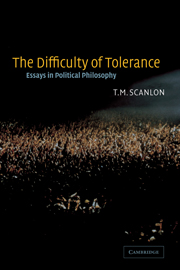Book contents
- Frontmatter
- Contents
- Acknowledgments
- Introduction
- 1 A theory of freedom of expression
- 2 Rights, goals, and fairness
- 3 Due process
- 4 Preference and urgency
- 5 Freedom of expression and categories of expression
- 6 Human rights as a neutral concern
- 7 Contractualism and utilitarianism
- 8 Content regulation reconsidered
- 9 Value, desire, and quality of life
- 10 The difficulty of tolerance
- 11 The diversity of objections to inequality
- 12 Punishment and the rule of law
- 13 Promises and contracts
- Index
7 - Contractualism and utilitarianism
Published online by Cambridge University Press: 15 December 2009
- Frontmatter
- Contents
- Acknowledgments
- Introduction
- 1 A theory of freedom of expression
- 2 Rights, goals, and fairness
- 3 Due process
- 4 Preference and urgency
- 5 Freedom of expression and categories of expression
- 6 Human rights as a neutral concern
- 7 Contractualism and utilitarianism
- 8 Content regulation reconsidered
- 9 Value, desire, and quality of life
- 10 The difficulty of tolerance
- 11 The diversity of objections to inequality
- 12 Punishment and the rule of law
- 13 Promises and contracts
- Index
Summary
Utilitarianism occupies a central place in the moral philosophy of our time. It is not the view which most people hold; certainly there are very few who would claim to be act utilitarians. But for a much wider range of people it is the view towards which they find themselves pressed when they try to give a theoretical account of their moral beliefs. Within moral philosophy it represents a position one must struggle against if one wishes to avoid it. This is so in spite of the fact that the implications of act utilitarianism are wildly at variance with firmly held moral convictions, while rule utilitarianism, the most common alternative formulation, strikes most people as an unstable compromise.
The wide appeal of utilitarianism is due, I think, to philosophical considerations of a more or less sophisticated kind which pull us in a quite different direction than our first-order moral beliefs. In particular, utilitarianism derives much of its appeal from alleged difficulties about the foundations of rival views. What a successful alternative to utilitarianism must do, first and foremost, is to sap this source of strength by providing a clear account of the foundations of nonutilitarian moral reasoning. In what follows I will first describe the problem in more detail by setting out the questions which a philosophical account of the foundations of morality must answer.
- Type
- Chapter
- Information
- The Difficulty of ToleranceEssays in Political Philosophy, pp. 124 - 150Publisher: Cambridge University PressPrint publication year: 2003
- 6
- Cited by



